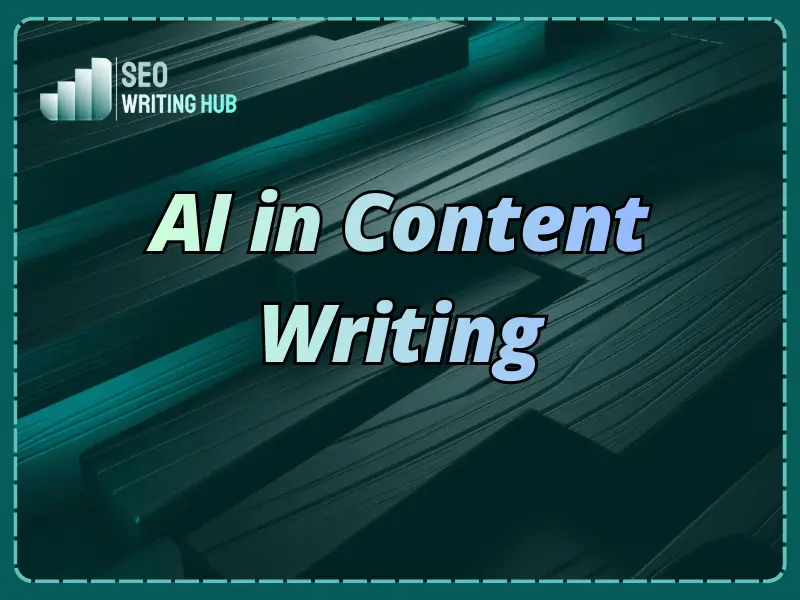AI in Content Writing: Is It an Authenticity Killer or Smart Shortcut?
Imagine!
You’re on your favorite news site. You come across an article that is crafted with clarity, wit, and depth. But suddenly you discover that it was not the work of a seasoned journalist. It was the output of an algorithm.
Does that make you feel any differently about it?
Would you doubt its credibility, or simply admire the efficiency?
This isn’t speculation anymore. It’s a fact. We all know that the digital content landscape is experiencing a significant change as AI evolves from a back-end tool to a front-line creator. AI in content writing is now capable of creating and crafting blogs, articles, and scripts. Not only this, but it can also write poetry with astonishing fluency. However, as this technology weaves deeper into the creative industry, it sparks an important question.
Can Artificial Intelligence genuinely mirror the depth of human creativity? Or does it risk eroding authenticity under the guise of efficiency?
Let’s go deeper into it.
AI in Content Writing.

The growth of AI in writing has been rapid and transformative. Now, many tools are available in the market, such as Jasper, Copy.ai, and OpenAI’s GPT series. And freelancers, large media outlets, and marketers are using it widely. Within minutes, these tools can churn out massive volumes of text. Additionally, this content is also audience-focused, SEO-optimized, and reader-friendly.
Leading publications have already tested AI.
But I think the articles on topics like finance, if generated by AI will need more concentrations. There might be factual inaccuracies. And this thing highlights the pitfalls of AI-generated content. So, we can say that AI can elevate content production to new heights, but it also threatens accuracy and originality.
The wider picture reflects a paradox. AI, on one hand, makes content creation more accessible by offering AI writing tools to small businesses and individuals that were once reserved for larger organizations. Yet on the other hand, it raises questions about long-held notions of trust, creativity, and authorship.
The Strengths and Constraints of AI Writing Tools
Now, let’s have an overview of AI’s limitations and advantages.
What AI Does Well?
AI writing tools are highly effective at predicting language flow and identifying patterns. Using huge datasets of existing writing, they generate content that follows grammar rules, flows naturally, and is stylistically versatile.
Let me tell you one more thing.
If I need a 1k-word article on “Sustainable Interior Design Ideas,” then no worries. AI is capable of producing and crafting my article faster than it takes to make a cup of coffee.
And when it comes to efficiency, AI is at the forefront. It significantly reduces expenses and saves time for businesses handling large volumes of content, such as:
- Newsletters,
- Product descriptions,
- SEO articles
Similarly, it supports writers with creative prompts, a quick first draft, and even grammar refinement.
Where AI Falls Short?
Always remember, being skilled at mimicry is not equivalent to being creative. The things that AI does not possess are critical thoughts, emotional nuance, and lived experiences. And these are the traits that shape exceptional writing. No doubt it can mirror the style, but it struggles with originality.
Here is an example to make things easier!
Suppose someone asks AI to write about grief.
What do you think he’ll receive?
He receives polished but hollow paragraphs.
Remember, a human writer who has faced personal loss can articulate its pain, nuance, and paradoxes with authenticity.
This difference shows that AI can produce words, but true human meaning and feelings remain out of reach.
AI tools are sometimes prone to hallucinations. Sometimes, they produce false information. It can be a significant risk in content writing where accuracy makes a big difference.
Exploring the Ethical Implications of AI-Generated Content
Now, it’s time to explore the ethical implications of AI-generated content. So, let’s get started.
Who is behind the words?
Have you ever wondered who deserves the credit for that AI-generated content?
- The algorithm?
- The developer?
- The human who prompted it?
Some readers often feel let down when they learn that the content was AI-written without prior disclosure.
Transparency is key here. And the audience has a right to know whether the content is written by a machine or a human.
Originality and the Risk of Plagiarism.
Here is another point to discuss. The reliance of AI on vast datasets can sometimes lead to content that closely mirrors existing works. This thing sparks complex issues of intellectual property. Is AI stealing from human authors? Is it simply remixing the ideas as humans sometimes do?
Fairness and Bias in AI Content.
We know that AI models and systems are only as objective as the data they are trained on. Trained on biased datasets, AI can end up reinforcing stereotypes and marginalizing voices.
This thing highlights a moral question.
Is it wise to permit algorithms to influence public narratives when they might unintentionally reinforce systemic inequities?
Future of Content Writing
As we look ahead, I think it’s improbable that AI will fully replace human writers. Rather than replacement, the future points toward collaboration.
Much like photographers embraced Photoshop without giving up their cameras. AI may serve as an added tool and supportive instrument for the writers rather than a substitute.
So, in the future, we may observe AI as a:
- Research Assistant
- Drafting machine
- Brainstorming partner
On the other hand, a more troubling scenario emerges. Content ecosystems might end up flooded with cookie-cutter AI posts.
However, if platforms prioritize quantity over quality, the internet could become overwhelmed by homogeneity. A place where each blog post or article reads the same, and authentic storytelling becomes harder to find.
But I think the success will hinge on the way we set boundaries. Industries may establish new rules, such as clear AI labels, originality checks, and human oversight.
And readers?
They’ll likely get better at spotting the differences, seeking out real voices over algorithmic noise.
Recommendations
Here are some practical suggestions for marketers, businesses, and content writers.
- It’s better to use AI as a tool, not a substitute. You can handle it like a calculator for words, which means proficient in speeding up your work, but unable to solve every issue.
- Do not use it to write all for you. Because human touch is essential, and this is the thing that makes your content appealing and worth reading. Don’t forget one thing that it’s always best to incorporate personal stories, reflections, and insights into the blog post. This is where true authenticity thrives. So, treat it as a paintbrush for writing.
- However, if someone uses it, disclose when appropriate. The reason is that transparency establishes trust. You can acknowledge it if AI contributed to a piece.
- Remember, you’ve your own identity as a writer. You’ve your own writing style. And you have your own voice. So, protect your voice. If you rely on AI too much, it may affect your unique style. One more thing to note is that always use it to enhance, not erase, your identity as a writer.
- Keep in mind, AI can assist, but it cannot attest. Verify every fact. And don’t assume its output is always correct. You need to double-check every claim and statistic.
- Stay well-informed and updated. The technology of AI is emerging rapidly. The writers must stay abreast of technological innovations, new tools, best practices, and ethical debates.
Final Thoughts
In a nutshell, AI in content writing is neither the destroyer nor the savior of creativity. In fact, it serves as a mirror highlighting our priorities as writers, readers, and businesses. If we prioritize efficiency over authenticity, there is a big risk of turning the art of writing into an assembly line of words.
However, the wise use of AI and the balance between integrity and innovation can open a new chapter where technology empowers, not erases, the voice of human storytelling.
We all know writing has always been more than merely arranging the words. It’s about connections. Even the most sophisticated algorithm can’t replicate the true heartbeat behind a story. Therefore, the future of content writing isn’t humans versus machines, but rather collaboration between them.
Let’s share the knowledge
everyone deserves it!






